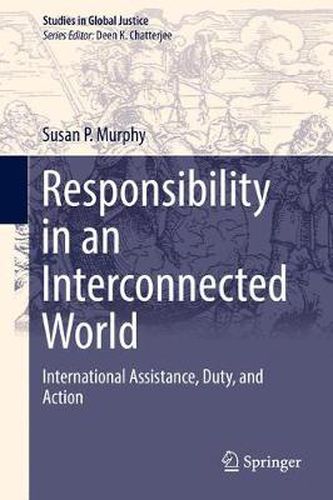Readings Newsletter
Become a Readings Member to make your shopping experience even easier.
Sign in or sign up for free!
You’re not far away from qualifying for FREE standard shipping within Australia
You’ve qualified for FREE standard shipping within Australia
The cart is loading…






This monograph opens with an examination of the aid industry and the claims of leading practitioners that the industry is experiencing a crisis of confidence due to an absence of clear moral guidelines. The book then undertakes a critical review of the leading philosophical accounts of the duty to aid, including the narrow, instructive accounts in the writings of John Rawls and Peter Singer, and broad, disruptive accounts in the writings of Onora O'Neill and Amartya Sen. Through an elaboration of the elements of interconnection, responsible action, inclusive engagement, and accumulative duties, the comparative approach developed in the book has the potential to overcome the philosophical tensions between the accounts and provide guidance to aid practitioners, donors and recipients in the complex contemporary circumstances of assistance.
Informed by real world examples, this book grapples with complex and multi-dimensional questions concerning practices and the ethics of aid. The author judiciously guides us through the debate between deontological and consequentialist moral theories to arrive at a sophisticated consequentialist account that does justice to the complexity of the problems and facilitates our deliberation in discharging our duty to aid, without yielding, as it should not, a determinate answer for each specific situation. Researchers, students, and practitioners of international aid will all find this book rewarding.
Win-chiat Lee,
Professor and Chair, Department of Philosophy, Wake Forest University
Susan Murphy’s book offers us a sophisticated exploration of the philosophical basis for aid. It is grounded in a full understanding of the complexities and pitfalls of the aid industry, but its particular strength lies, mainly through an extensive discussion of Singer, Rawls, O'Neill and Sen, in a comparison of consequentialist and duty-based approaches, eventually endorsing a broad non-idealised, situated consequentialist account in what she calls an interconnected ethical approach to the practice of assistance. For anyone wanting to think carefully about why we should give aid, this book has much to offer.
Dr Nigel Dower
Honorary Senior Lecturer, University of Aberdeen
Author of World Ethics - the New Agenda (2007)
$9.00 standard shipping within Australia
FREE standard shipping within Australia for orders over $100.00
Express & International shipping calculated at checkout
This monograph opens with an examination of the aid industry and the claims of leading practitioners that the industry is experiencing a crisis of confidence due to an absence of clear moral guidelines. The book then undertakes a critical review of the leading philosophical accounts of the duty to aid, including the narrow, instructive accounts in the writings of John Rawls and Peter Singer, and broad, disruptive accounts in the writings of Onora O'Neill and Amartya Sen. Through an elaboration of the elements of interconnection, responsible action, inclusive engagement, and accumulative duties, the comparative approach developed in the book has the potential to overcome the philosophical tensions between the accounts and provide guidance to aid practitioners, donors and recipients in the complex contemporary circumstances of assistance.
Informed by real world examples, this book grapples with complex and multi-dimensional questions concerning practices and the ethics of aid. The author judiciously guides us through the debate between deontological and consequentialist moral theories to arrive at a sophisticated consequentialist account that does justice to the complexity of the problems and facilitates our deliberation in discharging our duty to aid, without yielding, as it should not, a determinate answer for each specific situation. Researchers, students, and practitioners of international aid will all find this book rewarding.
Win-chiat Lee,
Professor and Chair, Department of Philosophy, Wake Forest University
Susan Murphy’s book offers us a sophisticated exploration of the philosophical basis for aid. It is grounded in a full understanding of the complexities and pitfalls of the aid industry, but its particular strength lies, mainly through an extensive discussion of Singer, Rawls, O'Neill and Sen, in a comparison of consequentialist and duty-based approaches, eventually endorsing a broad non-idealised, situated consequentialist account in what she calls an interconnected ethical approach to the practice of assistance. For anyone wanting to think carefully about why we should give aid, this book has much to offer.
Dr Nigel Dower
Honorary Senior Lecturer, University of Aberdeen
Author of World Ethics - the New Agenda (2007)